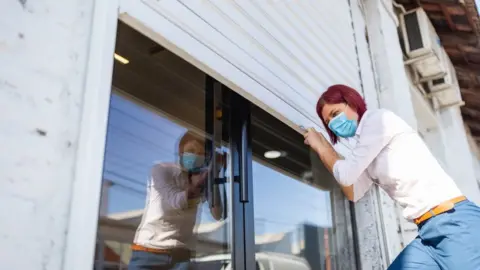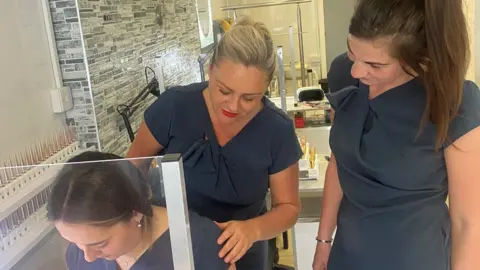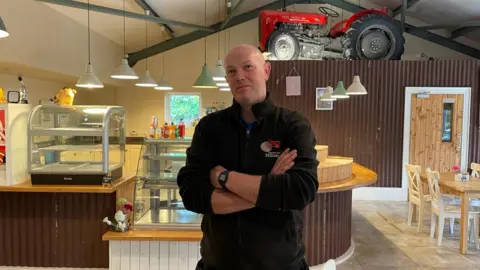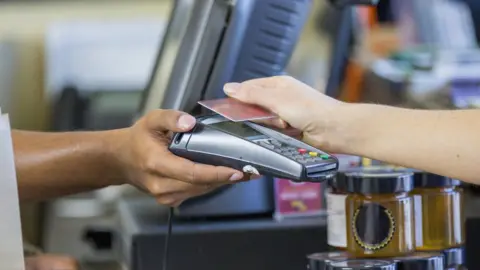Cost-of-living crisis 'killing' small businesses in Northern Ireland
 Getty Images
Getty Images"They're killing us." "My heart is completely broke." "It isn't worthwhile anymore."
These are the desperate words of small business owners across Northern Ireland who are facing the impact of the cost-of-living crisis.
As people struggle to keep up with the rising costs of heating, eating and putting fuel in their cars, small businesses are facing up to a new reality - scraping by or shutting up shop.
Samantha McFadden is one of those struggling with the squeeze.
The owner of Roscho Beauty in Newtownabbey told BBC News NI "everybody is hanging on by the skin of their teeth".
"They're killing us with fuel prices and the rates," she added.
Ms McFadden is keeping prices as low as she can at her fully-booked business, but times continue to be tough.
 Samantha McFadden
Samantha McFadden"We're basically open when clients need us. I haven't put my prices up since we came back from the pandemic because I know how hard people are struggling.
"The average person on the street doesn't have enough for their messages."
She added: "The small guy on the street is done for. We are a busy, successful salon, but we haven't had a full recovery. We've just gone from one crisis to another."
It's a crisis that's claiming businesses all over Northern Ireland - and it looks like it will only get worse.
Broken hearts and empty purses
Pat O'Kane Family Butchers in Coleraine announced its closure via an emotional video from its owner on Facebook.
"My heart is completely broke but it's out of my hands," said Patrick O'Kane.
He had avoided putting his prices up, but said the bigger problem was that his customers couldn't afford to eat well anymore.
"The footfall is not on our streets," he added.
"Things are tight for everybody, we understand that. We still tried to bring you the best offers that we could but we're losing money every week."
Allow Facebook content?
In Portadown, Church Street Pantry is making plans to bring the shutters down.
It told followers on Facebook that the "small sustainability-focused business is just no longer sustainable".
The company said the rising cost of electricity and stock, combined with a drop in footfall, had forced them into a "difficult and emotional decision".

What costs are affecting small business?
The UK is facing the highest rate of inflation in 40 years.
Experts have suggested that the crisis will continue to worsen, with two of Northern Ireland's biggest food companies having already warned customers to expect further price rises this year.
In the past 12 months, all of Northern Ireland's electricity and gas providers have put up their prices multiple times, increasing energy bills by hundreds of pounds a year.
Measures have been put in place to support businesses from falling into financial difficulty, including a £50m rates support package.
But businesses owners like Samantha McFadden say they are "living in fear of the end of June".
That's when a 'rates holiday' is due to end, meaning retail and hospitality businesses will begin paying rates for the first time since before the pandemic.
The absence of an executive means ministers are restricted on what powers they can exercise to help those who are suffering with rising costs.
Gareth Hetherington, director of the Ulster University's Economic Policy Centre, described the timing of the end of the rates holiday as unfortunate, but said an extension would not be practical.
"There isn't a huge amount of money that the executive, or lack thereof, can give businesses," he said.
"A further extension of the rates holiday is not financially viable. The priority is on health and dealing with the aftermath of Covid, so the extra money is not there for us."

The Hillstown Farm Shop in Randalstown, County Antrim had been a thriving business for 15 years, but the rising cost of living has forced the team to close its award-winning café until further notice.
It said the business had encountered "the perfect storm" of increased rates, electricity, gas and ingredients.
"It wasn't worthwhile anymore," Nigel Logan, one of the owners, told BBC News NI.
 Nigel Logan
Nigel Logan"Margins are tight enough in a café. It's very hard to charge what we would have needed to charge just to make a profit from it."
He said he hopes the closure won't be permanent and that the café is "on hold" while he sees what happens with rising costs.
What can be done to help?
Everyone is now familiar with the cost-of-living crisis, but Gareth Hetherington said a lesser-known problem is hurting small businesses too - the cost-of-doing business crisis.
That refers to the consequences of passing business costs onto customers.
Small businesses can't be saved by putting their prices up because that would affect the frequency and volume of customer sales.
Roger Pollen, from the Federation of Small Businesses, said the government should look at fuel duty rates and policy costs that could be reduced to help businesses.
 FatCamera/Getty Images
FatCamera/Getty Images"Some of the very smallest firms are already reporting unmanageable energy bills, long before we get to next winter's rises," he added.
He said he knew of one chip shop owner who is facing a 120% rise in oil prices, 115% rise in fish prices, and a 100% rise in fat prices.
The owner's energy costs have almost quadrupled, from £1,000 a month to £3,800.
Gareth Hetherington also said that encouraging businesses towards renewable sources of energy long-term would be beneficial.
"Those energy sources are less subject to what is happening in the oil and gas markets," he added.
In a statement, the Department for the Economy said the unprecedented rises in energy bills highlighted the importance of their local energy strategy - The Path To Net Zero Energy - which is encouraging the use of natural resources.
It added that Economy Minister Gordon Lyons will "shortly be meeting with senior executives from the energy companies to discuss rising energy prices and to explore whether anything further can be done".
A spokesperson for the Department of Finance said the Finance Minister Conor Murphy has delivered over £560m of rates support to businesses who have not paid rates since March 2020.
They added: "The finance minister is acutely aware of the pressures facing businesses and has repeatedly called on the British Government to reduce VAT on energy bills to support businesses."
